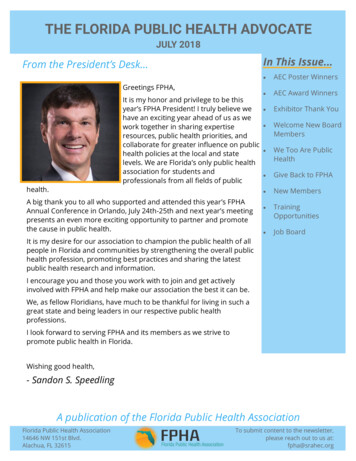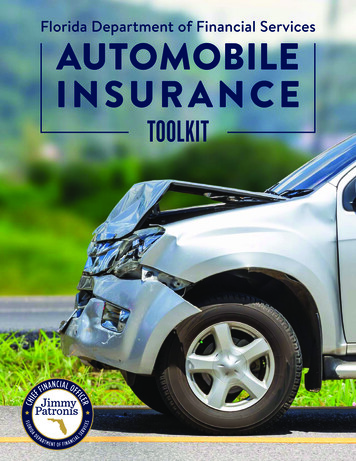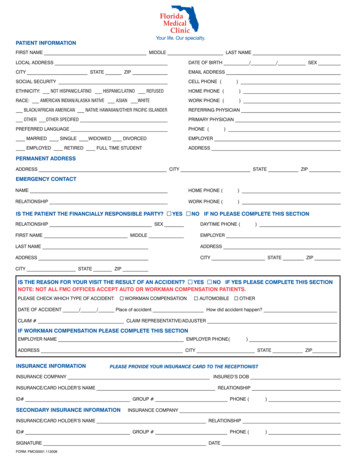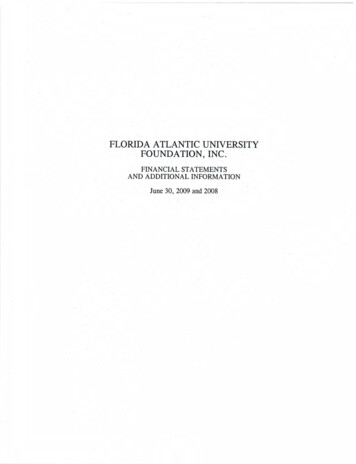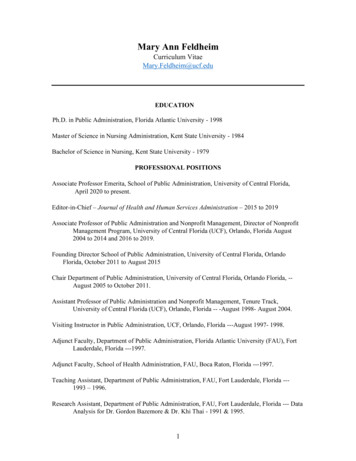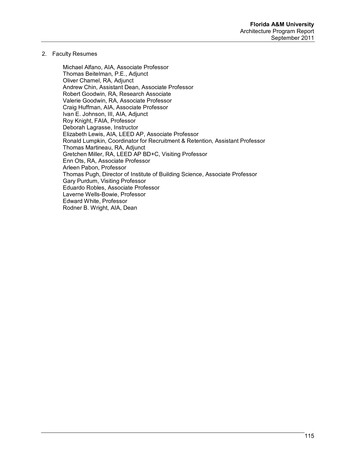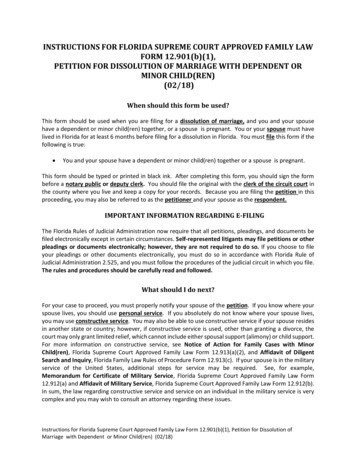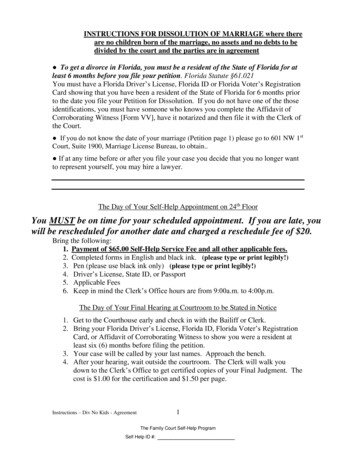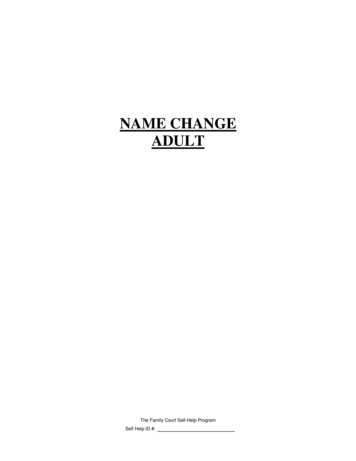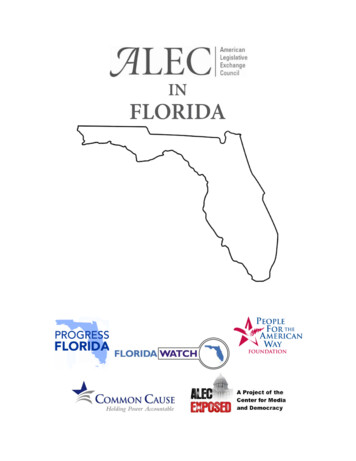
Transcription
Table of ContentsEXECUTIVE SUMMARY . 4Key Findings . 4INTRODUCTION TO ALEC . 5What is ALEC? . 5THE ALEC AGENDA . 6Voter ID And Election Laws . 6Corporate Power And Workers’ Rights . 7Undercutting Health Care Reform . 7Tax Policy . 7Privatization of Public Schools . 8Obstructing Environmental Protection . 8ALEC IN FLORIDA . 8Florida & ALEC State Legislators . 8Leadership Roles . 8ALEC Florida Members . 10ALEC Scholarship Fund ‐ Pay To Play . 10A Night on the Town in New Orleans . 11ALEC Corporate Members . 12ALEC MODEL BILLS IN FLORIDA . 18Immigration . 18Education . 31Healthcare . 37
Gun Industry . 40Corporate Welfare . 44Labor . 45Prisons . 48CONCLUSION . 50What Can Be Done . 50Resources . 50Acknowledgements:The authors of this report are substantially indebted to Beau Hodai of DBA Press and the Center forMedia and Democracy (CMD), who filed and shared the information requests that furnished much of thevital information presented in this report. The authors are equally indebted to CMD/PRWatch, whobeyond contributing to this report, helped establish the open‐source AlecExposed website, which hasbeen an invaluable tool for ALEC researchers across the country. We also appreciate the advice andassistance research colleagues at People for the American Way. 2012 Progress Florida, Florida Watch, People For the American Way, Center For Media andDemocracy, Common Cause
EXECUTIVE SUMMARYThis report documents the footprint that ALEC, the American Legislative Exchange Council, has inFlorida. ALEC’s impact in state legislatures across the country cannot be underestimated. Thiscorporate‐funded 501(c)(3) organization has been operating and expanding since its inception in 1973.ALEC has unprecedented access to lawmakers and to the composition of the bills they pass into law.Out of Florida’s 160 state legislators, 60 have had ties with ALEC since 2010 through dues records orrecords of its task forces where corporate lobbyists vote as equals with legislators on “model” bills behindclosed doors. In the House, 46 representatives have been affiliated with ALEC task forces; in the Senate,14 senators.ALEC and its legislative leaders in the state have supported and pushed some of Florida’s mostdevastating legislation. Despite claims to the contrary, ALEC’s agenda is not based primarily uponideology, but mostly upon pecuniary rewards for its corporate funders. The resulting ALEC “modelbills” that have been adopted by ALEC “task forces” have been introduced in Florida by ALECrepresentatives and have amended Florida statutes for the worse, harming the rights and opportunities ofeveryday citizens in the process.KEY FINDINGSThe key findings of this report include: ALEC model bills introduced across the country have devastating impacts upon publiceducation, consumer protections, environmental protections, workers’ rights, equitablehealthcare systems, just tax policy, and voting rights. ALEC has a strong and growing presence in Florida. ALEC’s public‐sector state chair in Floridais Representative Jimmy Patronis Jr. (R‐6). ALEC’s corporate‐funded scholarship fund contained, as of January 1, 2011, 46,467. This fund isused to sponsor ALEC members to attend ALEC conferences, and is also spent – as documentedin the report – to wine and dine ALEC Florida members alongside corporate lobbyists.Corporations’ expenditures for the fund can be written off as 501(c)(3) charitable donations ontheir tax returns. ALEC provides Florida members with “issue alerts,” “talking points,” and “press releasetemplates” expressing support or opposition to state legislation, despite its claims that “ALECdoes not lobby in any state.” The organization also tracks the status of its model bills inlegislatures and bills it does not like, and sends its employees to testify in support of its bills instate houses across the country. ALEC model legislation has been introduced in Florida’s legislature, at times word for word,with devastating results.
In response to ALEC’s extreme agenda, 26 for‐profit corporations – including Wal‐Mart,McDonalds, and Kraft – four non‐profit groups and over 50 lawmakers have dropped ALEC inrecent months. This report concludes that Florida‐based corporations and Florida ALECmembers should do the same.INTRODUCTION TO ALECWHAT IS ALEC?ALEC is a corporate‐funded entity that helps corporations get special interest and corporate‐writtenlegislation passed into law. When legislators in multiple states introduce similar or identical bills to boostcorporate power and profits, undermine workers’ rights, limit corporate accountability for pollution orharm to Americans, privatize public education, or restrict voting rights, the odds are good that suchlegislation was written by corporate lobbyists working through ALEC.ALEC’s major funders and corporate leaders include Exxon Mobil, Altria, AT&T, GlaxoSmithKline,Johnson & Johnson, Koch Industries, PhRMA, Peabody Energy and State Farm Insurance, among dozensof others. Over 98% of ALEC’s 7 million in revenue a year comes from corporations, special interests,and sources other than legislative dues (which run 50 per year for legislators).1ALEC is a registered 501(c)(3) nonprofit organization that exists ostensibly to promote “limitedgovernment, free markets, federalism, and individual liberty.”2 Founded in 1973, the self‐describedassociation is, in its own words, a “far‐reaching national network of state legislators that affects alllevels of government. No organization in America today can claim as many valuable assets that haveinfluence on as many key decision‐making centers.”3The organization’s boastfulness is not unfounded. ALEC claims to have more than 2,000 active membersin state legislatures across the country and over 100 alumni members in Congress, and it claims to be thelargest nonpartisan individual membership association of state representatives in the nation. 4 Theorganization has members in every state, and in some states has a majority presence in the legislature – inArizona, for example, 54% of state legislators are ALEC members.5 Every year across the country, ALEClegislators introduce 800 to 1,000 ALEC model bills in the 50 state legislatures, of which 20% are enactedinto law.6By paying much higher “dues” than legislators in addition to sponsorship fees, corporations are able toparticipate in ALEC conferences, where their lobbyists and executives vote as equals alongside theelected officials they are paid to influence in “task forces” on ALEC “model legislation.” These modelbills are often drafted by corporate lawyers prior to ALEC conferences, sponsored in task force meetingsby corporate lobbyists, and are then – if adopted by the task force – introduced in state legislatures acrossthe country without proper disclosure of the origins of the bills and the lobbyists involved.
ALEC task forces are comprised of two equal contingents: representatives of corporations and specialinterests, and elected representatives. Task force meetings are conducted behind closed doors and are notopen to the public. In attempts to view the process, journalists have been asked to leave ALECconferences, and have been threatened with arrest by hotel security and contracted police.7Not only does ALEC enable corporations and special interests to hand state legislators ʺmodel bills,ʺ theyalso provide a vehicle for their corporate members to buy influence with legislators through gifts offlights, hotel rooms, and other perks denominated as ʺALEC scholarships.ʺ8 These corporate expendituresinto ALEC’s scholarship fund are also registered as 501(c)(3) donations, creating the antithetical situationwhere corporations are able to deduct their lobbying expenses as charitable donations on their taxreturns.Furthermore, ALEC’s magazine declares that members are “encouraged to contact ALEC’s public affairsdepartment for assistance with drafting press releases, booking radio and television appearances,building media lists, and participating in media training.” Disproving their claim that “ALEC does notlobby in any state,”9 the organization also provides legislators with “background research, talking points,sample press releases, and other media resources” to support passage of their model legislation andresolutions,10 and emails “issue alerts” to legislators in support of, or against, specific bills in statelegislatures.11Despite this influence, ALEC had operated in the shadows until the Center for Media and Democracy(CMD) launched ALECexposed last year after a whistleblower provided CMD with over 850 model billssecretly voted on by corporate lobbyists and legislators. Since then, CMD and other good governmentgroups have been able to connect the dots between ALEC bills and ALEC legislators and corporationsthat many have expressed concerns about but were unable to prove without the bills.That secrecy was not a coincidence; it was deliberate. For what ALEC truly does, and what ALECactually represents is not only immoral, many have argued it is illegal.THE ALEC AGENDAALEC corporations are diverse in their makeup and come from a wide range of industries. Thus, ALECmodel legislation covers a wide range of industries, and provides those industries with a wide range ofloopholes, tax breaks, and returns. In ALEC’s repertoire, there exist countless bills that have no directpurpose except to financially reward corporate funders of the ALEC network. The following topics aredirectly affected by ALEC model bills (a full list of exposed ALEC model bills can be found atALECExposed.org):VOTER ID AND ELECTION LAWSALEC has played a central role in the emerging trend among state legislatures to consider voter ID laws.12Using false allegations of “voter fraud,” ALEC politicians are pursuing policies that disenfranchisestudents and other at‐risk voters ‐‐ including the elderly and the poor ‐‐ who are unlikely to have drivers’licenses or other forms of photo ID.13 Despite sensationalized claims to the contrary, the problem of
“voter fraud” is virtually non‐existent in America; reports show that even in battleground states likeOhio, voter fraud occurs at an insignificant rate of 0.0000004%.14 The reason ALEC supports bills like theVoter ID Act has little to nothing to do with prohibiting non‐existent voter fraud, and everything to dowith shifting the electoral landscape in their favor. ALEC’s key founder, Paul Weyrich, once stated: “Idon’t want everybody to vote. Elections are not won by a majority of people, they never have been from thebeginning of our country and they are not now. As a matter of fact, our leverage in the elections quite candidly goesup as the voting populace goes down.”15In addition, ALEC wants to make it easier for corporations to participate in the political process. TheirPublic Safety and Elections taskforce has long included Sean Parnell of the Center for CompetitivePolitics, one of the most vociferous pro‐corporate election groups that promotes legislation that woulddevastate campaign finance reform and allow for greater corporate influence in elections. ALEC supportsthe Citizens United decision and opposes disclosures of spending to influence elections by outsidegroups. ALEC has opposed bans on pay‐to‐play activities and even opposed mandatory rules to allowcitizens adequate time before hearings or votes so citizens can participate in a meaningful way.16CORPORATE POWER AND WORKERS’ RIGHTSALEC works fervently to promote laws that would shield corporations from legal action and allow themto limit the rights of workers. The group’s model legislation would roll back laws regarding corporateaccountability, workers compensation and on the job protections, collective bargaining and organizingrights, prevailing wage and the minimum wage. ALEC is a main proponent of bills that undermineorganized labor by stripping public employees of collective bargaining rights and “right to work” laws.They also push “regulatory flexibility” laws that lead to massive deregulation.17 It is no surprise that thestaff director of ALEC’s Commerce, Insurance and Economic Development Task Force previously wasfunded as a Koch Associate at the Charles G. Koch Charitable Foundation.18UNDERCUTTING HEALTH CARE REFORMAfter the passage of federal health care reform in 2010, one of ALEC’s top priorities has been to challengethe law by encouraging members to introduce bills that would prohibit the law’s insurance mandate.ALEC’s Health and Human Services task force is led by representatives of PhRMA and Johnson &Johnson (until J & J left ALEC this past month). Representatives of Bayer and GlaxoSmithKline sit onALEC’s board.19 ALEC’s model bill, the “Freedom of Choice in Health Care Act,” has been introduced inforty‐four states, including Florida, and ALEC even released a “State Legislators Guide to RepealingObamaCare” discussing a variety of model legislation including bills to partially privatize Medicaid andSCHIP.20 The legislative guide utilizes ideas and information from corporate‐funded groups that areconnected to ALEC, like the Heritage Foundation, the Goldwater Institute, the James Madison Institute,the Cato Institute, the National Center for Policy Analysis and the National Federation of IndependentBusiness.21TAX POLICYAs states face challenging budget deficits in the wake of the crash of Wall Street in 2998, ALEC wants tomake it more difficult to generate revenue in order to close shortfalls. Bills include the “Super MajorityAct,” which makes it so complicated for legislatures to change tax policy that California votersoverturned the law which allowed a minority to thwart majority will;22 the “Taxpayer Bill Of Rights”(TABOR) which brought fiscal disaster to Colorado; and measures to eliminate capital gains andprogressive income taxes.23 The main beneficiaries of ALEC’s irresponsible fiscal policies are corporationsand the wealthiest taxpayers.
PRIVATIZATION OF PUBLIC SCHOOLSDespite constitutional problems, negative impacts on public schools, bias against disadvantagedstudents, and comprehensive studies in cities – like those analyzing Washington DC, New York,Milwaukee, and Cleveland – which demonstrate that private school voucher programs failed to make anyimprovements to the education system,24 ALEC sees private school vouchers as a way to radicallyprivatize the public education system. Under the guise of “school choice,” ALEC pushes bills with titleslike “Parental Choice Scholarship Act” and the “Education Enterprise Act” that establish private schoolvoucher programs. ALEC has also been an active supporter of online education corporations, despite thenegative results of such programs. A representative of Connections Academy, which is a division ofConnections Education LLC, a for‐profit online schooling company, co‐chairs ALEC’s Education TaskForce.25 Matthew Ladner, one of ALEC’s most prominent advisors on education policy and a formereducation advisor to Jeb Bush, recently received a “Lifetime Bunkum Award” from the NationalEducation Policy Center at the University of Colorado in Boulder for promoting false and misleadinginformation in pushing ALEC’s school choice agenda.26OBSTRUCTING ENVIRONMENTAL PROTECTIONAt the bidding of its major donors like Exxon Mobil and Koch Industries, ALEC is behind state‐levellegislation that would hinder the ability of government to regulate and curb polluters.27 ALEC haspreviously said that carbon dioxide “is beneficial to plant and human life alike,” and promotes climatechange denialism.28 The group’s model legislation assails EPA emissions guidelines and greenhouse gasregulations, destabilizes regional climate initiatives, and pushes for massive deregulation of air and waterpollutions, which would basically permit the free‐reign of dirty energy companies. Unsurprisingly,ALEC’s “Energy, Environment and Agriculture” task force was formerly led by Tom Moskitis of theAmerican Gas Association and currently chaired by Martin Shultz of Brownstein Hyatt Farber Schreck, amajor lobbyist firm for oil and gas companies like ConocoPhillips.29 The group receives funding fromExxonMobil, Shell, Chevron, Texaco, Amoco, the American Petroleum Institute, and the AmericanElectric Power Association.30ALEC IN FLORIDAFLORIDA & ALEC STATE LEGISLATORSOut of Florida’s 160 state legislators, 60 have had known ties to ALEC since 2010. In the House, 46representatives have been affiliated with ALEC; in the Senate, 14 Senators. And ALEC’s presence inFlorida is on the rise – according to released documents from Representative Jimmy Patronis’ office,Florida lawmakers’ attendance at ALEC’s 2011 annual conference held in New Orleans was “one of thestrongest delegations in years.” 31LEADERSHIP ROLESFlorida’s Public Sector State Chair is Representative Jimmy Patronis Jr. (R‐6).32 As of 2011, Florida’sPrivate Sector State Chair was David Nickles of the lobbying firm, the Nickles Strategy Group LLC.33 Asacting as the liaison between Florida lawmakers and the ALEC office in Washington D.C., overseeing the
ALEC scholarship fund, and coordinating additional ALEC outreach in Florida.Representative Patronis nominated the following Florida lawmakers to serve as task force members forthe two‐year term of January 1, 2011 – December 31, 2012 (recorded below as written by Patronis):CIVIL JUSTICE TASK FORCE:Primary NominationRepresentative Charles McBurneyRelated Committee(s) in State LegislatureCivil ChairCOMMERCE, INSURANCE, AND ECONOMIC DEVELOPMENT TASK FORCE:Primary NominationRelated Committee(s) in State LegislatureRepresentative Bryan NelsonInsurance and Banking ChairINTERNATIONAL RELATIONS TASK FORCE AND FEDERAL RELATIONS WORKING GROUP:Primary NominationRelated Committee(s) in State LegislatureRepresentative Scott PlakonChair FederalPUBLIC SAFETY AND ELECTIONS TASK FORCE:Primary NominationRepresentative Ray PilonRelated Committee(s) in State LegislatureCriminal Justice MemberTAX AND FISCAL POLICY TASK FORCE:Primary NominationRepresentative Steve PrecourtRepresentative Javin BroduerRelated Committee(s) in State LegislatureTax Chair(illegible) MemberEDUCATION TASK FORCE:Primary NominationRepresentative Anitere FloresRelated Committee(s) in State LegislatureEducation ChairENERGY, ENVIRONMENT, AND AGRICULTURE TASK FORCE:Primary NominationRelated Committee(s) in State LegislatureRepresentative Clay FordEnergy ChairHEALTH AND HUMAN SERVICES TASK FORCE:
Primary NominationRepresentative Gayle HarrellRepresentative John WoodRepresentative Matt HudsonRelated Committee(s) in State LegislatureHealth Chair Subcommittee“”“”TELECOMMUNICATIONS AND INFORMATION TECHNOLOGY TASK FORCE:Primary NominationRelated Committee(s) in State LegislatureRepresentative Michael BilecaALEC FLORIDA MEMBERSIn keeping with its secretive nature, ALEC does not publicize its membership, thus making complete andaccurate membership rolls nearly impossible to obtain. However, we know the following Floridalawmakers paid membership dues or attended at least one ALEC conference since 2010 (lawmakersbelieved to have been dues paying members at least once from 2010‐12 are denoted with an asterisk):*Sen. Michael Bennett (R‐21)*Sen. Larcenia J. Bullard (D‐39)Sen. Lee Constantine (R‐22)*Sen. Nancy C. Detert (R‐23)*Sen. Mike Fasano (R‐11)*Sen. Anitere Flores (R‐38)*Sen. Rene Garcia (R‐40)Sen. Mike Haridopolos (R‐26)*Sen. Alan Hays (R‐25)*Sen. Dennis Jones (R‐13)*Sen. Garrett Richter (R‐37)*Sen. David Simmons (R‐22)*Sen. Ronda Storms (R‐10)Rep. Larry Ahern (R‐51)*Rep. Ben Albritton (R‐66)*Rep. Frank Artiles (R‐119)*Rep. Dennis Baxley (R‐24)Rep. Michael Bileca (R‐117)Rep. Jeff Brandes (R‐52)*Rep. Jason Brodeur (R‐33)*Rep. Rachel Burgin (R‐56)*Rep. Matt Caldwell (R‐73)*Rep. Dean Cannon (R‐35)Rep. Richard Corcoran (R‐45)Rep. Fred Costello (R‐26)Rep. Steve Crisafulli (R‐32)Rep. Daniel Davis (R‐13)*Rep. Jose Diaz (R‐115)*Rep. Chris Dorworth (R‐34)*Rep. Brad Drake (R‐5)*Rep. Anitere Flores (R‐114)*Rep. Clay Ford (R‐3)*Rep. James C. Frishe (R‐54)*Rep. Rich Glorioso (R‐62)Rep. Eduardo Gonzalez (R‐102)*Rep. Denise Grimsley (R‐77)Rep. Gayle Harrell (R‐81)*Rep. Doug Holder (R‐70)*Rep. Mike Horner (R‐79)*Rep. Matt Hudson (R‐101)Rep. Clay Ingram (R‐2)*Rep. Paige Kreegel (R‐72)*Rep. John Legg (R‐46)*Rep. Ana Rivas Logan (R‐114)*Rep. Debbie Mayfield (R‐80)Rep. Charles McBurney (R‐16)Rep. Peter Nehr (R‐48)Rep. Bryan Nelson (R‐38)*Rep. Jeanette Nunez (R‐112)*Rep. Jimmy T. Patronis, Jr. (R‐6)*Rep. Ray Pilon (R‐69)*Rep. Scott Plakon (R‐37)*Rep. Stephen L. Precourt (R‐41)Rep. Lake Ray (R‐17)*Rep. Ron Saunders (D‐120)*Rep. Kelli Stargel (R‐64)Rep. John Tobia (R‐31)Rep. Carlos Trujillo (R‐116)Rep. Will Weatherford (R‐61)*Rep. John Wood (R‐65)Rep. Dana Young (R‐57)ALEC SCHOLARSHIPS FUND PAY‐TO‐PLAYALEC’s scholarship funds can be used to cover the costs that ALEC legislators incur when attendingALEC conferences. These conferences are by no means austere; ALEC conferences are held in lushresorts like the Westin Kierland Resort in Scottsdale, Arizona, or in resorts right in Florida’s backyard
(ALEC held a policy conference at the Ritz Carlton in February of 2012 on Amelia Island – picturedbelow).34Scholarship fund help pay for airfare, hotel rooms, and other expenses of ALEC legislators during theseconferences, which provide meals and drinks in addition to other freebies. On top of those perks, ALECoffers other benefits for ALEC representatives. An invitation sent to Representative Patronis on October12, 2011, stated: “Your registration is also covered, including all scheduled meals, off‐site tours, andreading materials – as well as an optional excursion through the Austin and the Texas countryside.”35Elected officials are also encouraged to bring their families to conferences, where ALEC offers subsidizedchildcare for kids six months and older in a program called “Kids Congress.”36 In 2009, ALEC spent 251,873 on childcare alone, which was partially subsidized by lobbyists and lawmakers.37ALEC scholarship funds are raised from corporate and special interest contributions. As of January 1,2011, ALEC’s Florida scholarship fund contained 46,467.38According to the Center For Media and Democracy, contributions to scholarship funds are generallymade through corporate lobbyists. For example, in Ohio, a Time Warner Cable lobbyist made a 10,000contribution to the Ohio ALEC scholarship fund.39 Unfortunately, unless the data is leaked, the details ofALEC scholarship funds are kept secret – to all except ALEC’s legislative leaders and the corporatelobbyists who made the donations. Some documents show that state legislators have solicited companiesdirectly for scholarship contributions, establishing a dangerous possibility for setting up quid quo proarrangements and certainly the perception of corruption.40A NIGHT ON THE TOWN IN NEW ORLEANSThe office of ALEC State Chair Jimmy Patronis sent out the invitation for ALEC’s 2011 annual conferencein New Orleans to Florida ALEC members in May of 2011. Within days, ALEC members started reachingout to Patronis’ office inquiring about scholarship fund applications, and corporate lobbyists beganrequesting the list of ALEC legislators who planned on attending the event.Representative Clay Ford was straightforward. “Should be a good meeting with good food,” he wrote toRepresentative Jimmy Patronis in an email. And good food there was.The Florida State dinner in New Orleans was planned by Representative Patronis and Tallahassee‐basedlobbyist Douglas Russell.4142 The meal took place Friday, August 5th at Antoine’s in the French Quarter.
The meal cost 120 or 127 per person, depending on the plate (menu picture below), but Floridalawmakers did not pay a penny – the meal was covered by the 501(c)(3) tax deductible, corporate‐fundedscholarship fund.The meal was attended by nearly as many corporate lobbyists as state legislators. The following Floridalegislators were joined by lobbyists representing Connections Education, Endo Pharmaceuticals,Blackstone, Bayer Healthcare, Comcast, and Endo Pharmaceuticals, among other clients. 43 44 45 46 47LEGISLATORS AT ALEC FLORIDA DINNER AT ANTOINE’SRep. Will Weatherford (R‐61)Rep. Chris Dorworth (R‐34)Rep. Richard Corcoran (R‐45)Rep. Stephen L. Precourt (R‐41)Rep. Stephen L. Precourt (R‐41)Rep. Rachel Burgin (R‐56)Rep. Lake Ray (R‐17)Rep. Matt Caldwell (R‐73)Rep. Michael Bileca (R‐117)Rep. Daniel Davis (R‐13)Rep. Jose Diaz (R‐115)Rep. Carlos Trujillo (R‐116)Rep. Dennis Baxley (R‐24)Rep. Steve Crisafulli (R‐32)Rep. Jason Brodeur (R‐33)Rep. Peter Nehr (R‐48)Rep. Ana Rivas Logan (R‐114)The ALEC Florida dinner at Antoine’s was not exceptional. Facilitating relationships between statemembers and corporate lobbyists is the essence of what ALEC does. However, just because ALEC’scorporate cozying is normalized does not mean it is ethically acceptable; as evidenced by the ALECagenda, the legislation that results from these relationships has devastating consequences for the peopleof Florida and other states.ALEC CORPORATE MEMBERSFor decades, corporations have been using ALEC as a vehicle to get their bills introduced in Florida.These corporations include major US brands like ExxonMobil, and foreign corporations with a USpresence like GlaxoSmithKline and Reed Elsevier (known for its Lexis/Nexis site; earlier this year thecorporation dropped out of ALEC), who are all currently represented on ALEC’s “Private EnterpriseBoard.” Below are the major corporations based in Florida that are known to have been affiliated with
ALEC in recent years:FLORIDA’S ALEC CORPORATE MEMBERSApotex Corp.Apotex is a Canadian‐owned pharmaceutical corporation. The company produces more than 300 genericpharmaceuticals in approximately 4000 dosages, exporting to over 115 countries around the globe.Founded: 1974Employees: 6,800Address: 2400 North Commerce Parkway, Suite 400, Weston, Florida, 33326Telephone: 1‐800‐706‐5575Arduin, Laffer & Moore Econometrics, LLCArduin, Laffer and Moore Econometrics is a conservative‐leaning economic consulting firm led by DonnaArduin, Dr. Arthur Laffer, and Stephen Moore. It advises federal, state, and municipal leaders andcandidates, as well as private sector clients. Both Moore and Laffer are long‐time ALEC supporters whomove their legislative agendas through ALEC.Founded: 2005Employees: UnknownAddress: 225 South Adams Street, Suite 200, Tallahassee, Florida 32301Telephone: 850‐205‐8020Parquet Public AffairsParquet Public Affairs is a national issue management,
In response to ALEC’s extreme agenda, 26 for‐profit corporations – including Wal‐Mart, McDonalds, and Kraft – four non‐profit groups and over 50 lawmakers have dropped ALEC in . Since then, CMD and other good government . funded as a Koch Associate at the Charles


